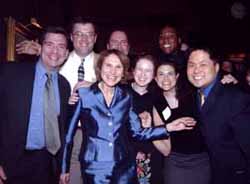The Klingenstein Center Celebrates 25th Anniversary
What is the Klingenstein Center and what have they been doing for the last 25 years? Under the direction of Pearl Rock Kane, recently named the Klingenstein Family Chair for the Advancement of Independent Schools, the Center has become renowned for preparing independent school administrators and teachers for increased leadership roles. John Klingenstein, who has been a TC Trustee since 1979, and his family, fund the Center in honor of their parents Esther A. and Joseph Klingenstein.
The dinner celebrating the 25th anniversary of the Center was held in recognition of Kane's 21 years as director and her new role as Klingenstein Chair. Hundreds of Klingenstein alumni joined TC faculty members and the members of the Kane and Klingenstein families in an evening that recalled Kane's influence on them and their work.
Lisa Darling, an alumna who chaired the planning committee for the event and is the Head of School at Wilmington Friends School in Wilimington, Delaware, did the introductions. Acting President Darlyne Bailey gave some background on Kane and the Klingenstein Center. She read from a letter sent by President Arthur Levine who is in Poland on sabbatical, which said, "The true measure of any educator is the impact we have on our students. By that standard, Pearl, you are an unparalleled success."
In addition, colleague Jay Heubert, Associate Professor of Education and Law, was asked to speak. "We all have different perspectives on the gentle, modest, seemingly fragile, relentless, tough-as-nails perfectionist we have gathered to honor tonight," he said just before sharing how warmly she welcomed him when he came to TC. "We are fortunate that you are among us," he said, addressing Kane.
The remaining speakers included alumni of the Center, Kane's husband and children, and current Klingenstein fellows, who honored Kane by roasting her with their memories of her sometimes extreme ways of taking care of business. Current fellow Michael Mersky remarked how the 2003 fellows were all expecting a reprieve from Kane's very daunting schedule when the President's Day blizzard hit New York. The audience erupted in laughter when he told how Kane had donned her cross-country skis and trekked across town in order to provide the fellows with a three-hour lesson at their hotel.
Similar memories poured forth from past and current alums who recalled Kane's perfectionism as well as her warm generosity along with her fabulous brunches.
Kane's family added their own perspective to life with the Klingenstein Center. Husband Richard gave insight into life at home from the time his wife became involved at Teachers College-first as a student and then as director of the Center. "We have not had a conversation in decades that has not included the Klingenstein Center. Maybe that's because I don't say a lot," he joked.
In her remarks, Pearl thanked her husband and credited him with being the most long-term pro-bono employee of the Center, when at midnight she will say to him, "Can you read this over and tell me what you think?"
Kane told how the establishment of the Klingenstein Center in 1977 was the "largest undertaking in the history of the Klingenstein Fund in a field where [the Fund] had limited experience and with an institution [TC] that had not been a recipient of the Fund's support." She added, "Twenty-five years and four programs later, the largest undertaking of the Klingenstein Fund has become even larger. We owe enormous gratitude to the Klingenstein Fund."
She announced the addition of a fifth program to the Center which will allow participants to enter an intensive-study master's program that will combine summer study with site-based research and practica during the school year.
Published Monday, Apr. 7, 2003
